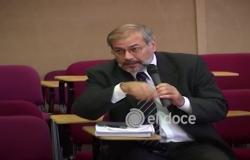
The Federal Criminal Chamber of the City of Buenos Airesissued a statement this Monday, April 15, in which he expressed emphatic support for the candidacy of the federal judge Ariel Lijo to integrate the Supreme Court of Justice of the Nation.
The jurisdiction of the Buenos Aires Justice argued that Lijo has more than 30 years of experience in the Judiciary, a career that supports his application. “With more than three decades working in different instances, Lijo is a true representative of the magistrates of the entire country,” they stated.
In addition, they review the background of the judge, proposed by the president Javier Milei to fill one of the vacant positions on the highest court. “Ariel Lijo is a lawyer graduated from the University of Buenos Aires, where he also taught. He began working in the Judiciary as a merit, and then joined the work team of prosecutor María Riva Aramayo. In 1993 Riva Aramayo went to work in the Federal Chamber, in Room I, and Lijo accompanied her for several years, reaching the position of Secretary of the Chamber. In 2004 he competed to fill one of the four vacancies in the Comodoro Py courts. He was among the first positions, his proposal was sent by the Executive Branch to the Senate, and in October his proposal was approved. Since then he has served as head of Federal Court No. 4″, report the members of the Buenos Aires Chamber.
“The nomination of members for the Supreme Court is one of the powers that the president has according to article 99, paragraph 4, of the Constitution. Once this is done the candidates They must be voted on by two-thirds of the Senate. Before that, an instance of public endorsements and challenges is opened. It is within this framework that the accessions of the entire Federal Criminal Chamber of the Capital have arrived,” they commented on the process.
The country’s highest court has been made up of four ministers since November 2021, when the resignation of Judge Elena Highton de Nolasco was made official. And in December of this year, the month in which Judge Juan Carlos Maqueda will turn 75, the members will be only three: the president Horacio Rosattiwho also chairs the Council of the Judiciary, the vice president Carlos Rosenkrantzand the judge Ricardo Lorenzetti.
For this reason, as indicated in the National Constitution, the Executive Branch proposed two names to complete the five positions on the Court. On March 20, the account of Manuel García-Mansilla to join the Court.
As highlighted by the jurisdiction of the Buenos Aires Justice, among the representatives of the Judiciary who have already sent their support to Ariel Lijo’s nomination are all the judges of the National Court of Appeals for Federal Criminal Correctional Matters of the Federal Capital, Drs. Leopoldo Bruglia, Mariano Llorens, Pablo Daniel Bertuzzifrom Room I, and Drs. Martín Irurzun, Eduardo Guillermo Farah and Roberto José Boicofrom Room II.
Then, they argue that “during more than 30 years working in the Judiciary, Lijo worked in several cases with a high media profile, such as the Ciccone casein which he prosecuted the then vice president Beloved Boudou – among others -, the case for the cover-up in the attack on the AMIA, the Siemens case, the case known as Correo Argentino, and the case for the murder of José Igancio Rucci in 1973, among many other cases.





